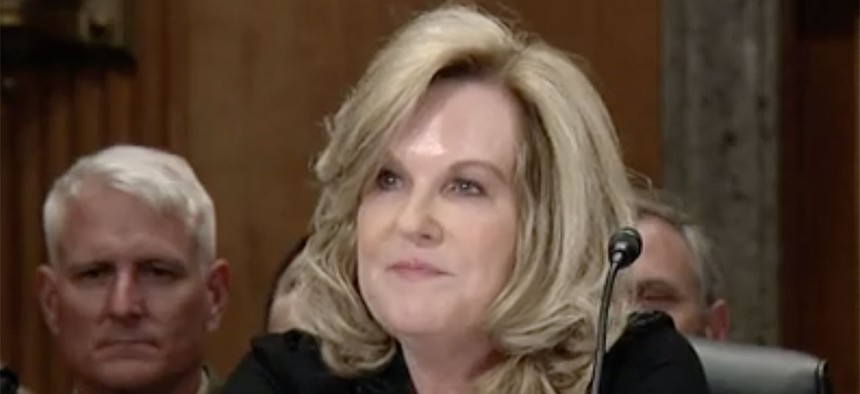
Recently confirmed OPM Director Dale Cabaniss wrote the memo. Senate Committee on Homeland Security & Governmental Affairs
OPM Calls on Agencies to Streamline Federal Firing
Agencies have until March 2020 to eliminate “unnecessary barriers to addressing poor performance,” and even stricter rules are likely on the way.
Office of Personnel Management Director Dale Cabaniss on Wednesday tasked agencies with finding ways to shorten the process of dealing with poor performers, setting a March 2020 deadline for implementing changes.
In her first published memo to agency heads since her confirmation earlier this month, Cabaniss said agencies must act to meet a goal set by President Trump’s management agenda “to maximize employee performance management and engagement.”
“A significant action that agencies should be taking to meet this challenge is streamlining and updating agency performance management and dismissal policies and procedures,” Cabaniss wrote.
In order to comply with the management agenda item, agencies must review whether existing policies “create unnecessary barriers to addressing poor performance,” and remove performance management procedures that are not required by law, the memo said. Officials also should remind supervisors that performance improvement plans can be initiated at any time and that they can issue adverse personnel actions for “unacceptable performance.”
Cabaniss wrote that these initiatives must be implemented by the end of March 2020, and that agencies must notify OPM of their compliance by April 30, 2020.
The memo comes less than two weeks after OPM filed a proposed rule to the Federal Register that would ease firing requirements and implement portions of an executive order not subject to an injunction. Under the new rules, agencies would be required to remind managers 90 days and 30 days in advance of when a new hire’s one-year probationary period expires, and encourage them to make an “affirmative” decision on whether to retain the employee.
The proposed regulation also would clarify that agencies are not required to help employees improve or provide a performance improvement period longer than federal law requires, and it would shorten the timeframe during which employees can respond to allegations of misconduct or poor performance before adverse personnel actions are formally proposed. It also would end the practice by which agencies and employees accused of wrongdoing can reach a settlement where workers resign in exchange for having adverse personnel actions stripped from their employment records.
The new guidance is likely not the last word on efforts to make it easier to fire federal workers. On Wednesday, the U.S. Court of Appeals for the D.C. Circuit declined a request to rehear federal employee unions’s legal challenge against three controversial workforce executive orders, and an existing injunction blocking key provisions of those orders likely will be lifted within the next week.
Among the proposals slated for implementation in the near future are requirements that all performance improvement plans be standardized at 30 days, and exempting adverse personnel actions from grievance procedures.







